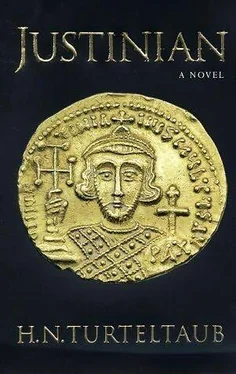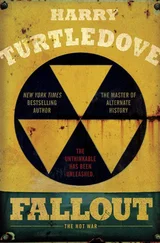Harry Turtledove - Justinian
Здесь есть возможность читать онлайн «Harry Turtledove - Justinian» весь текст электронной книги совершенно бесплатно (целиком полную версию без сокращений). В некоторых случаях можно слушать аудио, скачать через торрент в формате fb2 и присутствует краткое содержание. Жанр: Историческая проза, на английском языке. Описание произведения, (предисловие) а так же отзывы посетителей доступны на портале библиотеки ЛибКат.
- Название:Justinian
- Автор:
- Жанр:
- Год:неизвестен
- ISBN:нет данных
- Рейтинг книги:3 / 5. Голосов: 1
-
Избранное:Добавить в избранное
- Отзывы:
-
Ваша оценка:
- 60
- 1
- 2
- 3
- 4
- 5
Justinian: краткое содержание, описание и аннотация
Предлагаем к чтению аннотацию, описание, краткое содержание или предисловие (зависит от того, что написал сам автор книги «Justinian»). Если вы не нашли необходимую информацию о книге — напишите в комментариях, мы постараемся отыскать её.
Justinian — читать онлайн бесплатно полную книгу (весь текст) целиком
Ниже представлен текст книги, разбитый по страницам. Система сохранения места последней прочитанной страницы, позволяет с удобством читать онлайн бесплатно книгу «Justinian», без необходимости каждый раз заново искать на чём Вы остановились. Поставьте закладку, и сможете в любой момент перейти на страницу, на которой закончили чтение.
Интервал:
Закладка:
Myakes came over and sat down beside me. "If I ever go to sea, Emperor, I mean to say, if I'm ever that stupid-"
"What? You won't even cross from Constantinople to Asia?" I teased.
"Maybe I'll go that far," he said. "Maybe. And maybe I won't, too." Plucking a blade of grass, he set it between his teeth, as if to say he was at one with the ground from which it sprang.
We rested for perhaps two hours before that first Bulgar returned not with one but with several of his fellows. One of them wore gold hoops in his ears and a gold armlet on his left wrist: a chief of sorts, unless I missed my guess. He did not dismount, staring down at me from horseback. In better Greek than his countryman had used, he said, "I hear Justinian had the nose of him cut off when they threw him out of Constantinople."
"I did," I answered, and touched first my repaired nose and then the scar on my forehead above it. "You see how the surgeon covered the hole with skin, so now I have a nose again, even if it is not such a good nose as I owned before."
Having studied me, he answered, "Why do you want to see the khagan?"
"I shall discuss that with the khagan," I answered haughtily. "Or is he in the habit of talking over his business with everyone he chances to meet?"
As nothing else had done, that show of arrogance went far toward convincing him I was what I said I was. Like the first Bulgar who had found me, he said, "You have to wait here a little while." He shouted orders in his own tongue to his men, a couple of whom rode away. Returning to Greek, he told me, "They will bring horses for you and your friends to ride."
While we waited, I introduced my companions to him and learned he was called Omurtag. He paid me the compliment of not asking again what I wanted of Tervel. But for the Bulgar who had found us, none of his followers spoke Greek. Seeing that, I realized how fortunate I had been on the initial encounter.
The Bulgars he had sent forth returned to the riverbank more quickly than had been the case after the first meeting. Moropaulos was the only one of us not an experienced horseman. He also fretted over his boat, saying, "What shall I do without it?"
"If I win," I said, "I'll make you rich enough to buy twenty boats, a hundred boats. If I lose, you'll die in battle or Apsimaros will cut off your head. You won't need this boat either way, will you?"
"But this is my boat," Moropaulos said, showing how he'd got his name. After a while, we cajoled him into leaving it behind. He awkwardly scrambled up into the saddle of the horse the Bulgars identified as the calmest of those they had bought. Calmest proved less than identical to calm, but Foolish Paul managed to keep from being pitched off onto his head.
We rode south and west from where we had come to solid ground. The countryside resembled the plain across which I had traveled to reach the court of Ibouzeros Gliabanos, but was not so limitless; to the south, silhouetted against the sky, I could see the mountains separating the land the Bulgars had stolen from us from that still under Roman rule.
Omurtag being a man of authority in his own right, he commandeered the services of a band of Bulgars we encountered as evening drew near. Thus we had plenty to eat, plenty to drink even if it was fermented mare's milk, and tents in which to sleep. The accommodations were similar to those we had had of the Khazars, one band of nomads apparently living as much like another as peasants near Thessalonike live like peasants near Nikomedeia.
We rode out again at first light the next morning and, after riding all day, came to Tervel that evening. Atil, where Ibouzeros Gliabanos dwelt, had come more than halfway toward transforming itself from a nomadic encampment to what might one day become a considerable city. The camp at which Tervel ruled had barely begun the same process. The Bulgars had built a wooden fence around a good stretch of territory surrounding Tervel's tent and those of his followers, but the khagan and his men still made their living from the herds that fence enclosed.
A rider went ahead to announce my arrival to Tervel. The fellow came back with permission for me to go on and meet the khagan. Omurtag, knowing which was Tervel's tent, led me to it. A couple of slaves- Romans, by their looks and by the Greek they spoke with each other- tended to the party's horses. Perhaps having learned who I was, they stared and stared at me.
I wonder whether Tervel's curiosity would impel him to come out and greet me, but he waited for me to go to him, he being after all sovereign in this place. The interior of his tent glowed with lamps of glass and silver- Roman plunder- till it was almost bright as day, though the lamps burned butter rather than oil as they would have done in Romania. More plunder- golden bowls, silver wine pitchers- gleamed in the lamplight.
Tervel, sitting there cross-legged on the carpet, wore plunder, too: a woman's jeweled earring in each ear and a necklace of nomismata. Since he had succeeded his father not long before, I expected him to be hardly more than a youth, as had been true for me. But he was a man of close to my own age, a battle scar seaming his right cheek, his face almost as lined and weathered as that of any other nomad.
My followers prostrated themselves before him; I bowed, as I had to Ibouzeros Gliabanos. When I straightened, he was studying me through narrow eyes like those of the Khazar khagan. "I think you really may be Justinian," he said in Greek as fluent as mine. "I guessed some mountebank was coming to fool me, but you have not only the wound- fixed some sort of way, I see- but also the look of the man I remember seeing."
"Have we met?" I asked. "Were you on an embassy to Constantinople? I hope you will not be angry if I say I do not remember you there."
"We have met." His smile showed excellent teeth. He somehow contrived to make them look very sharp. "It was not in Constantinople. I have never been inside Constantinople. But you have come here before. I saw you then. I fought your men, to try to keep them and you from getting back inside the Roman Empire. We failed"- he shrugged-"but not by much."
"No, not by much," I admitted. "That was half a lifetime ago for me." Much of my reign had been half a lifetime ago for me. "You would have been young to fight then."
"My first battle," he agreed. "You Romans should never have got away. We should have trapped you and killed every one of you."
I should be stretching a point if I said I liked Tervel from the outset. But I could tell at once that he and I, agreeing or not, would always be able to understand each other. We thought alike: half-measures satisfied neither of us.
I said, "When my father came here with his army, he should have destroyed every one of you Bulgars. Then my campaign would not have been needed."
"When your father came, and all the ships vomited out their soldiers, we thought he was the most fearsome man in the world," Tervel answered, smiling that unpleasant smile once more. "Then we found the soldiers only knew how to run away from us. They fought better with you leading them, I must say."
"Why- thank you," I said in some- more than some- surprise. Up till that moment, whenever people compared me to my father, they always found me the lesser. So much had I come to take that for granted, the possibility it might not be so smote me with the force of Paul's revelation on the road to Damascus.
Tervel either did not notice my confusion or controlled himself so well, he revealed nothing of his thoughts. He said, "And now you come to me without an army at your back, Justinian. Tell me why this is. Did I not hear you married the daughter of the Khazar khagan? Is he not your friend?"
"I married his sister," I said. He inclined his head, accepting the correction. I went on, "I think he would be my friend, if he did not think being Apsimaros's friend counted for more."
Читать дальшеИнтервал:
Закладка:
Похожие книги на «Justinian»
Представляем Вашему вниманию похожие книги на «Justinian» списком для выбора. Мы отобрали схожую по названию и смыслу литературу в надежде предоставить читателям больше вариантов отыскать новые, интересные, ещё непрочитанные произведения.
Обсуждение, отзывы о книге «Justinian» и просто собственные мнения читателей. Оставьте ваши комментарии, напишите, что Вы думаете о произведении, его смысле или главных героях. Укажите что конкретно понравилось, а что нет, и почему Вы так считаете.












